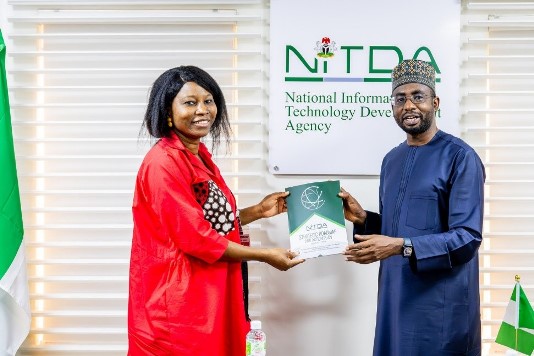The National Information Technology Development Agency (NITDA) and International Financial Corporation (IFC) are collaborating to create robust regulatory frameworks to push up government policies at transforming the country’s digital economy.
RELATED: IFC, Viva Tech announce 45 emerging startups with biggest impact potential in Africa
Director General, NITDA Kashifu Inuwa Abdullahi, told a visiting delegation from the IFC, led by its Senior Economist, Ms Nadege D. Yameogo, in Abuja that the new deal is in line with the vision of President Bola Ahmed Tinubu to diversify the nation’s economy.
According to him, the Ministry of Communications, Innovation, and Digital Economy, NITDA’s supervisory ministry, has already unveiled Strategic Five Pillars to enhance productivity through technological innovation.
The pillars: Knowledge, Policies, Infrastructure, Innovation, Entrepreneurship & Capital, and lastly, Trade are designed at pushing forward the growth agenda of government.
“Knowledge is the foundation upon which countries build a robust and sustainable economy and it was imperative to create an enabling environment where innovations and entrepreneurship ecosystem can thrive and commercialised globally,” he told the IFC team; adding: “When we invest and we build the infrastructure, it will enable us to trade “made in Nigeria” products and services, as well as our greatest resource, which is our talent.”
He said NITDA was re-crafting its Strategic Roadmap & Action Plan (SRAP) policy document in implementing the ministry’s strategic plan of accelerating the country’s collective prosperity through technical efficiency. Adding that the aim is to co-design the document so that the ecosystem could co-create the strategy and implement it.
The reworked document would have eight strategic pillars with Fostering Digital Literacy and Cultivating Talent as one of the core pillars.
His words: “We have the National Digital Literacy Framework (NDLF) where we have a target of achieving 95% digital literacy by 2030, and we have a midterm target of 70% by 2027. So, in the designing of this strategy, we want to get the stakeholders that will execute because we want it to be a strategy for execution.”
According to him, NITDA was is already working = to bring all stakeholders on board in providing input on how to design the strategy and identify some legal frameworks for the second pillar which is to ‘Strengthen Policy Implementation and Legal Framework’ and the third pillar on ‘Building a Robust Technology Research Ecosystem.’
The fourth pillar on Promoting Inclusive Access to Digital Infrastructure & Services will bridge the digital divide in the country and ensure everyone has access to the safe and responsible use of digital devices and platforms.
“We have a target of 40% of women inclusion as well as people living with disability and children as well. We have different initiatives for all these demographic groups”, said Abdullahi.
The pillar on Strengthening Cyber Security and Enhancing Digital Trust underscores the importance of building the trust of Nigerians through the development of legal frameworks for digital signatures and public key infrastructures.
The sixth pillar of Nurturing an Innovative and Entrepreneurial Ecosystem’ underscores the need to constantly invest in talents that will create many innovative solutions for the health care, education, financial and other sectors.
The seventh and eighth pillars are Forging Strategic Partnership & Collaboration, and Institutional Reform respectively to underscore the agency’s willingness to build strategic partnerships with stakeholders including the IFC.
“We believe we can learn from you and other organisations through strategic partnership and collaboration so that we can build strong institutions in Nigeria and Africa”, the NITDA boss said.
Yameogo assured NITDA of the IFC’s commitment to promoting Nigeria’s digital economy and remarked that the IFC’s priority area of interest is in “the digital economy because of the developmental impact it can bring in terms of job creation, reducing regional disparities, creating opportunities for private investment and bringing more private capital into the country.” cannot be overemphasized.
She said digital infrastructure development needs more attention and it is an area private investors can intervene in terms of agri tech, creative tech and healthcare tech.































